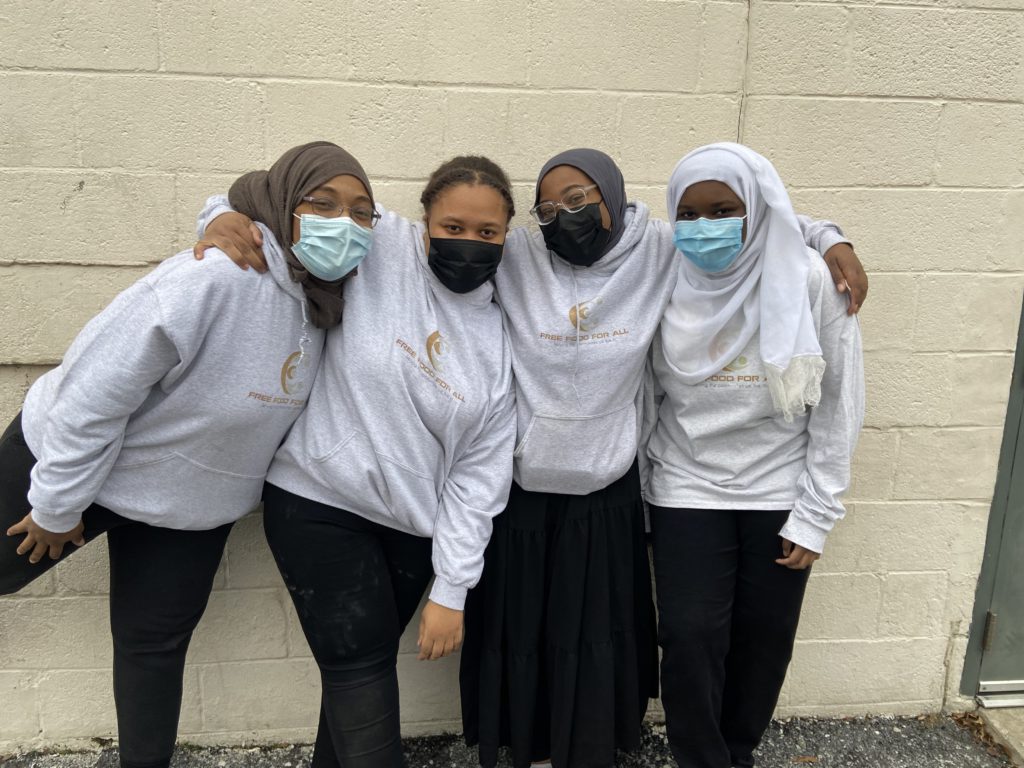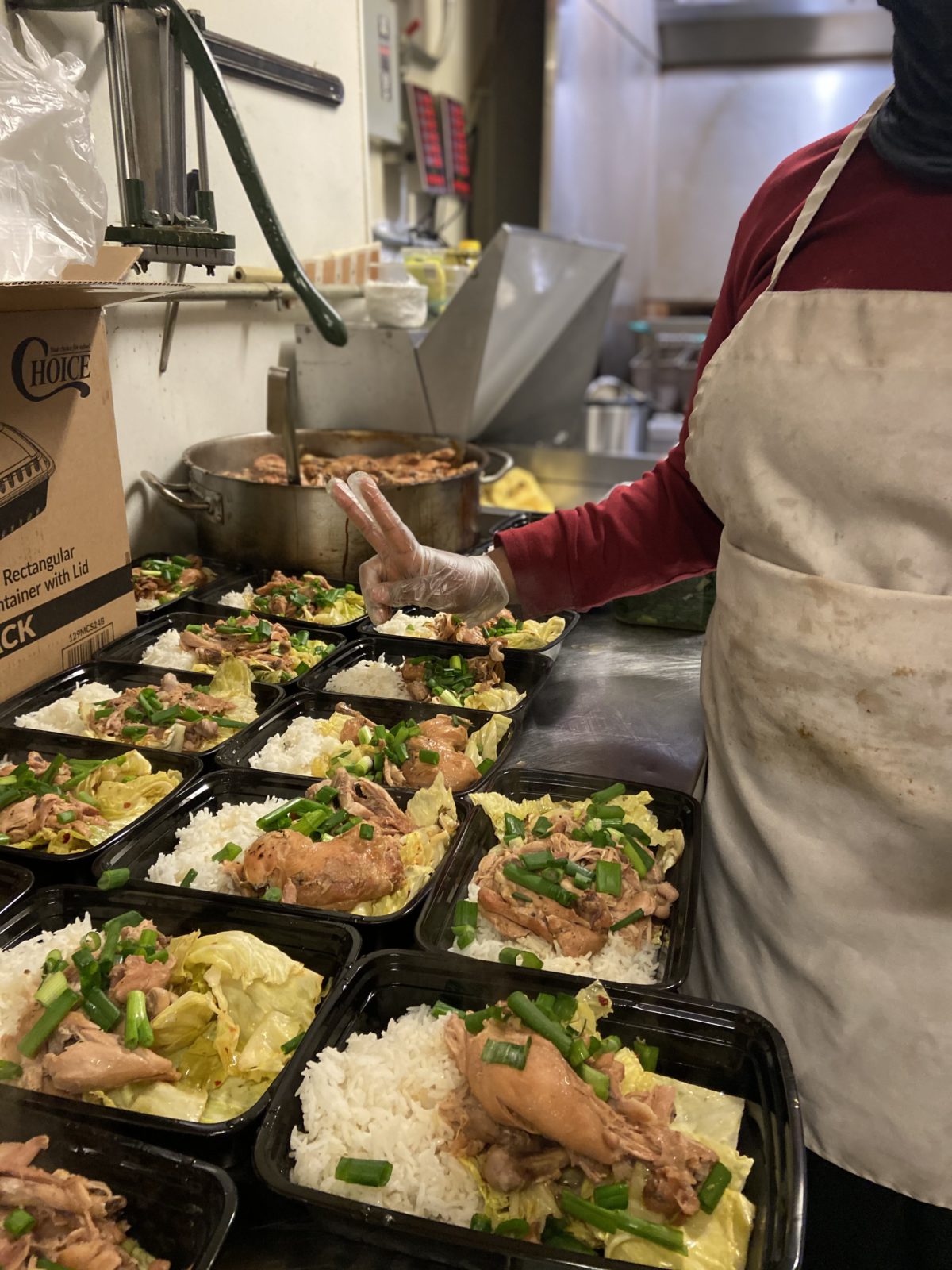On a sunny, yet windy, March morning, I headed to Milk and Honey Cafe in downtown Wilmington to meet with Jamilah Abdullah. Addullah runs Free Food For All Delaware (FFFA DE). The only thing I knew about FFFA DE was that they provided community meals. I was eager to learn more. How did they start? What drove their mission? How were they building up their communities and providing both food and dignity to people?
We both ordered a signature Milk and Honey latte – with oat milk – and settled into a comfortable seating area with a large window allowing the sun to warm us. Once we were both comfortable, I pulled out my laptop, eager to get to know Jamilah more and hear about her love for her neighbors.
What is FFFA and what do you all do?
We service the community that we live in by providing chef and diverse meals to the community. We focus heavily on the nutrition aspects and local sourcing, so we use mostly local and organic food when we can. We are a mutual aid organization not a non-profit. People help us and we help them.
Why did you start doing this work?
We started out giving to the elderly, sick, and disabled population in Wilmington. Since we’ve grown, we try to serve anyone who needs a meal. We don’t ask what their income is, or where they live, or their financial stability, because everyone has a moment where they need a little help. Covid has shown that, and we felt that ourselves.
This spiraled out of our religious background. It happened in Ramadan because we’d all come together and eat a meal. Someone would provide a meal and we didn’t have to pay for it out of our own pockets. In 2020 when everything shut down, we had people who couldn’t get out to those Ramadan meals. We – my mother and my sister, and a few community members of ours who would help us deliver meals – came together and worked to provide meals to people who needed them. We grew from doing 25 meals to 50 meals every week during those four weeks.
So you are a mutual aid organization that serves the community, and you don’t have any tests that people need to pass to receive food?
With different organizations you have to fill out a form, or show your address to prove you’re a resident of the area, but we don’t do any of that. We don’t get any grants. We all just work together, and get funds from local people who want to help us out.
How did you transition from Ramadan meals to routine meals?
After Ramadan, we saw that there was a need, and people wanted us to consistently offer the free meals. I decided to do it once a month, since that was something I was able to do with my work schedule and other life obligations. We started partnering with local gardens, and hosting the free food giveaway out of that garden for a few months in the summertime. Then we transitioned to a different location, still doing the giveaways once a month.
Are they raw ingredients or prepared meals?
Prepared meals. Sometimes we would collaborate with the garden to give out produce or groceries, but it would always come with a prepared meal.
It would fluctuate between 50 and 150. We were doing 150 meals for a solid four months – October 2020 to January 2021 – and have since then gone down to 100 and sometimes 75 or 125.
This was connected to when we used to deliver meals to elderly housing buildings. We would leave a signup sheet at three locations, allow people to list their allergens and what meal they wanted to get for the day and if they wanted a produce bag. That [delivery service] was why we got up to 150 meals. The reason we stopped doing that is because we don’t have delivery drivers anymore.
We had volunteers who were able to do the delivery driving, and we don’t have as many volunteers anymore.
So now that we have just one central location, it’s hard for more people to get out, so it’s not necessary to prepare 150 meals anymore. At the end of the day, if there are leftovers, we take the meals to the community fridges.

What community fridges do you use?
There’s one fridge by Kingswood Community Center, and one by Henrietta Jones Center.
Those are Planting to Feed fridges, right?
Yes, they’ve got three fridges.
I think they have another one in southern Delaware, but I’m not certain. But I think I saw something about a fridge outside of New Castle County opening from them.
Yeah, I was attending an event hosted by Westside Grows, and was advertising about Free Food For All. And there was someone attending the event who inquired about Free Food For All and mentioned that they needed something like that in downstate Delaware and that we should consider going there.
What do you think about that?
It’s definitely something I want to look into. I’d want to see what other organizations are down there that we could partner with, or bring our extra hands to help.
I don’t really care about being the face of things, I just want to help.
Along with Planting to Feed, have you partnered with other organizations so far?
Yes. For a solid eight months, me and Humbly Assisting Humanity used to partner and do events together.
And were those community meal events?
Yes, we would do the meals and they would hand out grocery bags and produce bags and essentials.
And do you still partner with them?
Occasionally. I can’t actually be physically there, but I would sometimes donate soups and meals when they do giveaways, on Saturdays, twice a month.
And why can’t you be there physically?
I work on weekends. Sometimes I use ingredients from my job. I’m a chef, and I know if we have extra.
Where are you a chef, and is the restaurant OK with you doing that?
Yes. I work at Kennett Brewing Company in Kennett Square. They allow us to use their kitchen to prepare meals. If we have any extra food, so it doesn’t go in the trash, I’ve talked with the owners and they are cool with me taking things that are still good quality and donating them.
This is really exciting to me because I’m planning to talk to another person for this series who is starting up some community kitchens in Wilmington. She said that they didn’t broadcast it at all, and they still got a waiting list of like 20 people while the first kitchen was being built.
I would like to be on that list!
I love that I’m talking to you first in this food justice series, because I’m already planning to talk to Planting to Feed, and you work with them a bit. And I’m planning to talk to the community kitchen person, and that’s something you’d love to connect with. And now I’ll need to reach out to Humbly Assisting Humanity and make it all connect!
Yes! She’s just blossoming into this amazing person that’s doing great things. She’s always doing great stuff.
And have you heard about Food Not Bombs?
Yes! I am also talking to them about being featured in this series.
I actually connected with them when they were supporting the people who were affected by the hurricane [Ida in fall 2021]. They were delivering meals to the hotels and the motel they were staying at, and they were looking for chefs and people who could help make food for them to give out. So I connected with them to help give food for two weeks. I made meals for about 20 or 25 people every week.
That is really interesting, because I’m also working on a story about the families who were affected, and continue to be affected, by Hurricane Ida and how difficult it’s been to get assistance from the state organizations.
Ok so let’s talk about funding. It sounds like at the start you were really providing all of this labor and all of the food out of your own pocket?
For the most part, yes, We would occasionally get someone who would donate something, or money. We do get more consistent donations now. At the end [of a donation drive], if we don’t reach our monthly goal, then I will add to that.
What’s the best way that our readers could support you and your work?
They can donate to my CashApp, Venmo, or Paypal. These are all under my personal handles. We also have a GoFundMe that is located on our website.
We originally made the GoFundMe when my car was stolen at the end of 2020, and that was our main vessel for delivering and transporting food. But we had a friend of mine who gave me her car for like two months, so I could continue doing what I was doing, and then we got donations that was enough for me to get a new car.
Have you thought about forming an official 501c3 or looking for a fiscal sponsor to manage those donations as they, maybe, increase?
Yes. I have been talking with someone who spoke about how I could get grants for what I’m doing. I told her I wasn’t really interested in becoming a nonprofit, but would be interested in having a fiscal sponsor. So I am looking for a nonprofit I would like to partner with, and trust we could gather grants and donations through that.
This is so exciting. Is there anything else you really want people to know about the work that you are doing, or the people that you interact with regularly as you provide these meals?
We always try to have an option for people who are gluten-free, vegan, or have a dietary restriction. Because in the community we serve, people assume they will take anything. But people value quality food, and they deserve to have quality food.
The last thing I want to add, if there are any chefs who are reading this, or food enthusiasts who want to give an extra helping hand, we could definitely use it, if they could reach out.
I know a chef that runs a soup popup and gave some of his soup, and it was really good. It would be great if people could bring their skills and expertise to the table.
What is the best way for people to contact you about volunteering or involving their skills?
On the website, there’s a section that says Join the Movement, and they could sign up there. Or they could direct message us on Instagram.
That’s what I did!
I will respond in 2-to-3 business days [laughs]

